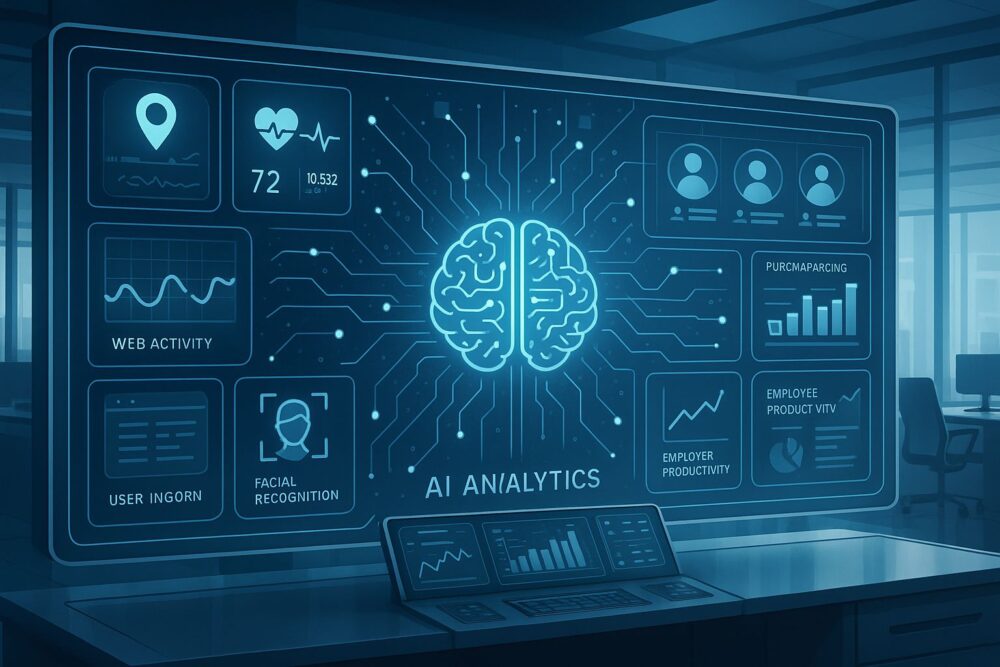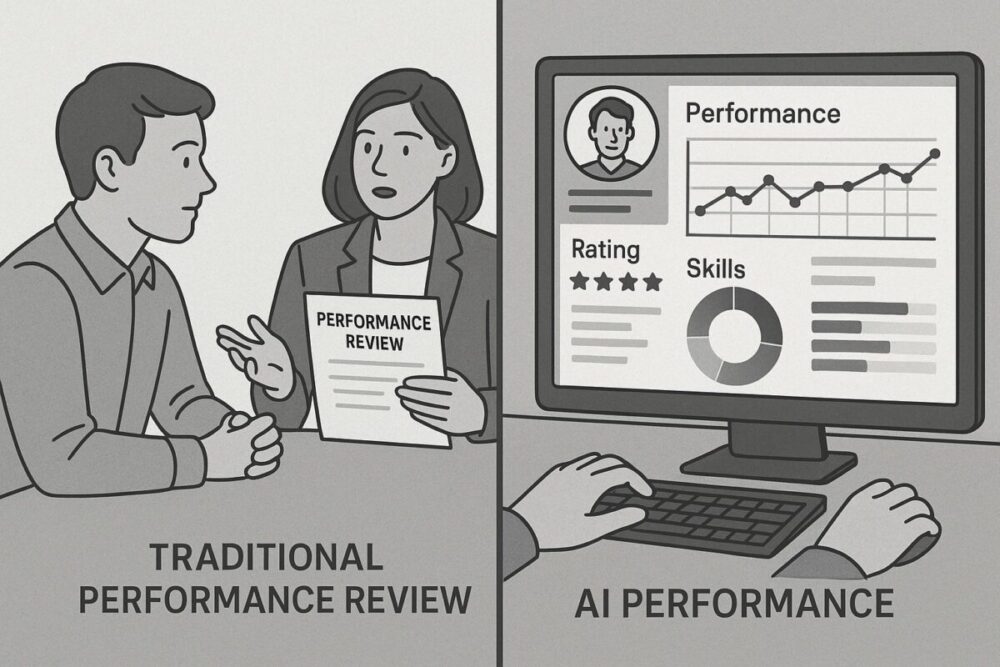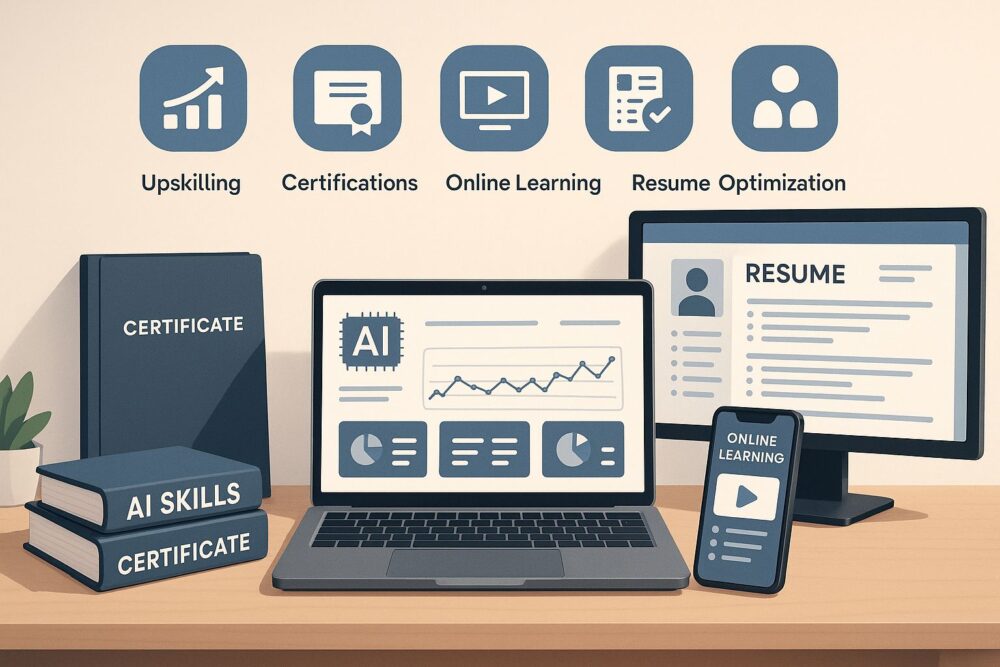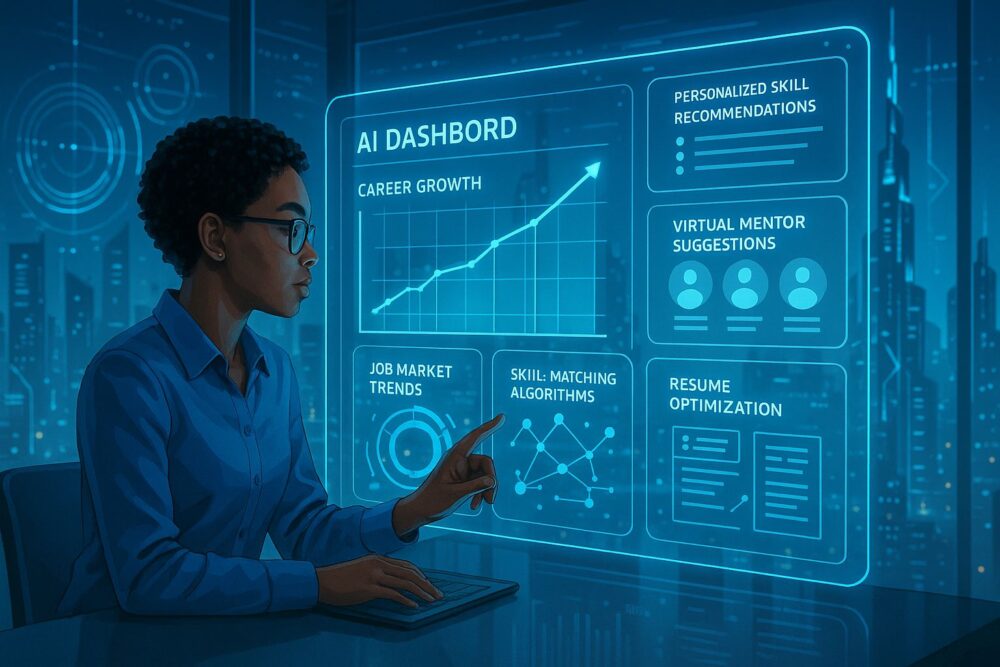AI Performance Tracking: Every Monday morning, Sarah receives an email with her weekly productivity score: 87/100. She assumes it’s just another corporate metric, like the satisfaction surveys she occasionally ignores. What Sarah doesn’t realize is that this score, generated by AI algorithms analyzing her digital footprint, has already influenced three major career decisions: her recent salary increase, her assignment to a high-visibility project, and her manager’s decision to recommend her for leadership development.
Sarah isn’t alone in her unawareness. Recent surveys reveal that 67% of companies now use AI performance tracking analytics, with many employees completely unaware that artificial intelligence systems are continuously analyzing their work patterns, predicting their career trajectories, and flagging potential issues before human managers ever notice them.
AI Performance Tracking: For professionals across the Middle East, India, Kenya, and other emerging markets where career advancement opportunities are intensely competitive, understanding these hidden AI systems isn’t just interesting it’s essential for career survival and advancement.
AI Performance Tracking: The Invisible AI Performance Monitoring Revolution
AI Performance Tracking: While most workers focus on impressing their human managers, sophisticated AI systems are quietly building comprehensive profiles of every employee’s performance, potential, and employment risk factors.
What AI Systems Track Daily:
Digital Behavior Analysis:
- Email response times and communication effectiveness patterns
- Project management tool engagement and task completion consistency
- Meeting participation rates and contribution quality metrics
- Learning platform usage and skill development progression
- Internal system usage patterns and efficiency indicators
Productivity and Quality Metrics:
- Work output volume and consistency across different time periods
- Quality scores based on error rates, revision requirements, and peer feedback
- Innovation indicators measured through idea contribution and implementation success
- Problem-solving efficiency tracked through support ticket resolution and project outcomes
- Cross-departmental collaboration frequency and effectiveness ratings
Predictive Risk Assessment:
- Likelihood of resignation based on behavioral pattern changes
- Promotion readiness scores calculated from competency development trends
- Team compatibility ratings and leadership potential indicators
- Performance trajectory predictions based on historical data analysis
- Training effectiveness and skill acquisition velocity measurements
How AI Influences Major Career Decisions
Promotion Recommendations: AI systems analyze thousands of data points to identify employees ready for advancement opportunities. These analyses often carry more weight than traditional performance reviews because they’re based on objective behavioral data rather than subjective manager opinions.
Case Example: Ahmed, a project coordinator in Dubai, was surprised when his manager recommended him for a team leader position. Unknown to Ahmed, the company’s AI system had identified him as having the highest leadership potential score in his department based on his conflict resolution success rate, peer collaboration metrics, and proactive problem-solving patterns.
Performance Improvement Targeting: When AI systems detect declining performance indicators, they can trigger intervention protocols before problems become serious enough for human managers to notice.
Risk-Based Decision Making: Companies use AI predictions about employee flight risk, performance trajectories, and cultural fit to make strategic decisions about resource allocation, training investments, and team compositions.
The Global Context: Why This Matters More in Emerging Markets
AI Performance Tracking: For professionals in the Middle East, Africa, and Asia, AI performance monitoring creates both opportunities and challenges that don’t exist in Western markets:
Opportunity Acceleration: In rapidly growing economies, AI Performance Tracking systems can identify high-potential employees faster than traditional methods, creating advancement opportunities for people who might otherwise wait years for recognition.
Objective Evaluation Benefits: AI systems can reduce bias related to nationality, gender, accent, or educational background that sometimes affects human hiring and promotion decisions in multicultural environments.
Skills Gap Identification: AI can identify exactly which skills professionals need to develop for advancement, providing clearer career development pathways than traditional feedback methods.
Market Intelligence: Understanding how AI systems evaluate performance gives job seekers and employees strategic advantages in positioning themselves for opportunities.
Strategic Career Protection and Advancement
1. Optimize Your Digital Professional Footprint
Communication Excellence:
- Maintain consistent, professional communication across all company platforms
- Respond to emails and messages within reasonable timeframes
- Participate meaningfully in digital meetings and collaborative tools
- Use clear, constructive language in all professional interactions
Productivity Consistency:
- Establish sustainable work patterns that maintain steady output quality
- Complete projects on schedule and document achievements in company systems
- Volunteer for high-visibility assignments that generate positive data points
- Maintain organized, up-to-date project management and task tracking
2. Understand Your Company’s AI Evaluation Criteria
Research Your Organization’s Tools:
- Identify which performance management and analytics systems your company uses
- Understand what metrics are tracked and how they influence decisions
- Ask HR about transparency in performance evaluation criteria and processes
- Request regular feedback to understand how your performance is being assessed
Game the System Ethically:
- Focus on metrics that AI systems typically prioritize: consistency, collaboration, growth, innovation
- Document achievements and learning experiences in company systems where AI can track them
- Maintain active engagement with professional development opportunities
- Build positive relationships across departments to improve collaboration scores
3. Build Strategic Human Relationships
AI Performance Tracking: While AI provides data for decision-making, humans still make final choices about promotions, assignments, and career opportunities.
Relationship Investment:
- Cultivate meaningful professional relationships with decision-makers who can advocate for you
- Ensure your story, context, and potential are understood beyond just data metrics
- Participate in company culture and team-building activities that strengthen interpersonal connections
- Seek mentorship from leaders who understand both AI Performance Tracking metrics and human potential
4. Proactive Career Development
Skill Development Strategy:
- Continuously update your capabilities in areas that AI Performance Tracking systems value
- Pursue certifications and training that demonstrate commitment to growth
- Stay informed about industry trends and emerging technologies
- Develop both technical skills and uniquely human capabilities like creativity and emotional intelligence
Performance Consistency:
- Maintain steady improvement trends rather than erratic high and low performance periods
- Set and achieve measurable goals that align with company objectives
- Document your contributions to team success and organizational improvements
- Seek feedback regularly and implement suggestions to show responsiveness and growth
Red Flags AI Systems Detect
Warning Signs That Trigger AI Attention:
- Declining engagement metrics over time (reduced participation in meetings, delayed responses, decreased initiative-taking)
- Stagnant skill development patterns (no new training, certifications, or capability demonstrations)
- Reduced cross-team collaboration (decreased interaction with colleagues outside immediate team)
- Communication pattern changes suggesting disengagement (shorter emails, reduced innovation contributions, minimal volunteer participation)
- Productivity inconsistencies (erratic work output or quality without clear explanations)
Early Intervention Opportunities: If you notice yourself exhibiting any of these patterns, take proactive steps to reverse the trends before they become significant enough to trigger AI-flagged performance concerns.
Career Enhancement Tools and Resources
Professional Assessment and Optimization:
Visit our comprehensive career tracking toolkit to:
- Audit your digital professional footprint across different platforms
- Understand how AI systems might be evaluating your performance
- Access templates for documenting achievements in trackable formats
- Connect with career advisors who understand AI-enhanced hiring and promotion processes
Skill Development Resources:
- Industry-specific training programs that improve AI-measured competencies
- Professional development courses designed to enhance both technical and human skills
- Networking opportunities with professionals who have successfully navigated AI-enhanced career environments
- Regular market intelligence about emerging skills and technologies valued by AI recruitment systems
The Future of AI-Enhanced Career Management
AI Performance Tracking: The integration of AI into performance management and career development will only accelerate. The professionals who thrive will be those who understand how to work with these systems rather than against them, leveraging AI insights while maintaining the human qualities that no algorithm can replicate.
Key Success Principles:
- Embrace transparency and data-driven feedback rather than fearing AI evaluation
- Focus on sustainable performance improvements rather than short-term metric manipulation
- Develop both AI-measurable skills and uniquely human capabilities
- Build authentic relationships that complement your data-driven performance profile
- Stay informed about technological changes affecting your industry and adapt accordingly
In the age of algorithmic career management, strategic self-awareness isn’t optional it’s essential. The professionals who understand how AI Performance Tracking systems evaluate potential and performance will have significant advantages over those who rely solely on traditional career development approaches.
AI Performance Tracking: Your career success increasingly depends on mastering the intersection of human potential and artificial intelligence evaluation. The question isn’t whether AI Performance Tracking will influence your career trajectory it’s whether you’ll understand and leverage that influence to achieve your professional goals.
Ready to optimize your career for AI-enhanced performance evaluation? Explore our comprehensive career development resources and connect with specialists who understand both traditional career advancement and AI-driven opportunities.








